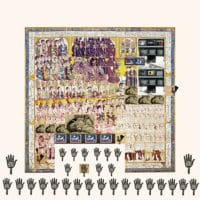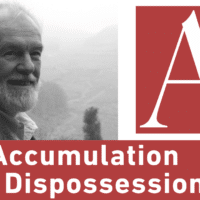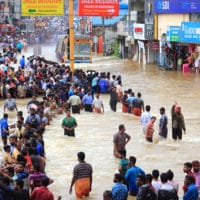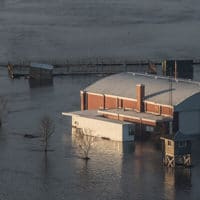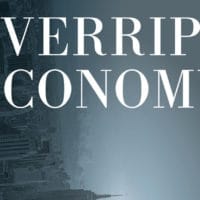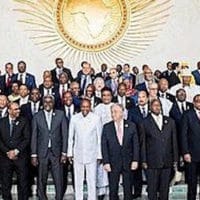-
The world divided by a line is a dead body cut in two
A war against Iran–as Hamid says–will be catastrophic, not only for Iran but for Eurasia. It would divide the world into two, vultures and hyenas feasting on both halves.
-
Regime change through social media
“If you can actually influence how people think, through social media, then you can have a lot more control” of their political behavior, said Valentine.
-
Strike before the planet gets hot
Greta Thunberg has called for a world-wide strike on Friday September 27-for children and adults. Here’s how to make this a reality.
-
The people are with Evo: a glimpse at a new Bolivia
e are going through difficult times, and we are hoping that there is light at the end of the tunnel and that we will set an example for the world. Only by organizing ourselves and continuously resisting without arms will democracy triumph again.
-
Anti-capitalist chronicles: Accumulation by Dispossession
Large capital takes over smaller capital and in the end you get a quasi monopolistic situation of the large capitalist dominating all else.
-
Finance and growth under neo-liberalism
A neo-liberal capitalist economy therefore does not have the instruments that capitalism earlier had for providing a bulwark against its slipping into recession and stagnation; the question is: does it have any instruments at all?
-
Michael Harrington and his afterlives
Doug Enaa Greene gives an overview and critique of the political journey of Michael Harrington, founder of the Democratic Socialist of America, and his influence on reformist socialism to this day.
-
Why stagnation?
The U.S. economy has been stuck in stagnation for a decade. The GDP growth rate has been only 2.2% per year since the recovery from the Financial Crisis and Great Recession of 2008-09 began. That is far below the growth rate in past post-recession recoveries since the end of World War II.
-
Revolutions and imperialist aggression
Throughout history, revolutions for national liberation and socialism, even progressive governments, have been the victims of systematic imperialist assaults.
-
Does Iran’s economic fate depend on a lifeline from China?
China has increased its oil purchases from Saudi Arabia by 43 percent in April. There is every indication that China will continue to increase its buys from the kingdom during the course of this year—to substitute for Iranian oil and, perhaps, for U.S. oil.
-
India, ideology and the New York Times
Liberals of all stripes ought to, in the years to come, pay careful attention to the way language is deployed in public discourse, to recognize shibboleths and call them out. Neoliberal reforms were smuggled in via this route, and if the exit-polls are to be believed, fascism will be next.
-
Traditional measures of unemployment are missing the mark
We’ve heard it countless times in recent media accounts: The economy is at “full employment.” The most recent jobs numbers, out the first week in May, show the official unemployment rate, and applications for unemployment benefits are at a 50-year low. The last time a recovery was able to push the unemployment rate to these […]
-
Why it’s important to connect anti-imperialism to climate action
Internationalist struggles make it possible for the oppressed of the world to unite against the oppressors of the world.
-
Students from 1,600 cities just walked out of school to protest climate change. It could be Greta Thunberg’s biggest strike yet
Hundreds of thousands of students around the world walked out of their schools and colleges Friday in the latest in a series of strikes urging action to address the climate crisis. According to event organizers Fridays for Future, over 1664 cities across 125 countries registered strike actions, with more expected to report turnouts in the coming days.
-
The wettest 12 months-new analysis shows spikes in flood alerts in the U.S.
April 2019 marked the wettest 12-month period in the United States since record-keeping began 124 years ago, breaking the previous record set from May 2015–April 2016. In most places in the contiguous U.S., by April 2019 it had already rained more than the annual average during the 20th century. This week, heavy rain is dumping up to 1 foot of rain in northern and central parts of the U.S.. It’s evident that extreme precipitation events are getting more extreme, and also that climate change is one of the culprits.
-
As the far-right wins Indian elections, progressive forces vow to resist
The modern global economy, essentially guarantees the continued expatriation of profits and natural assets from resource-rich but capital-poor countries, facilitating the enrichment of the global economic elite and Multinational Corporations (MNC), at the expense of developing countries. To elaborate on the themes of corporate plunder, resource nationalism and people-centered forms of resource management, Tricontinental: Institute for Social Research spoke with Gyekye Tanoh, head of the Political Economy Unit at the Third World Network-Africa based in Accra (Ghana).
-
Money on the Left: Confronting Monetary Imperialism in Francophone Africa
Ndongo Samba Sylla on the history of political economy in pre- and post-colonial Africa, the theoretical bases and political stakes of the anti-CFA Franc movement, and how Modern Monetary Theory (MMT) ought to inform current and future efforts to restore political and economic sovereignty to West African nations.
-
Review of Alan Nasser’s, Overrripe Economy
Alan Nasser has written a masterful book, one that belongs in every serious leftist and socialist library, and one that certainly deserves to be widely and extensively read.
-
Socialism–the Litmus test for authentic African leadership
A man lost in the desert needs water and lots of it. If instead, a rescuer gives him a really excellent novel and a comb, the desperate man will be confused and angry.
-
The dogs of war are unchained once more
This week’s newsletter features an open letter to the President of Indonesia, written by Khamid Istakhori, General Secretary of Federasi SERBUK–a large trade union federation in Indonesia. He asks President Jokowi to use Indonesia’s presidency of the UNSC to denounce violations of international law against Venezuela.

